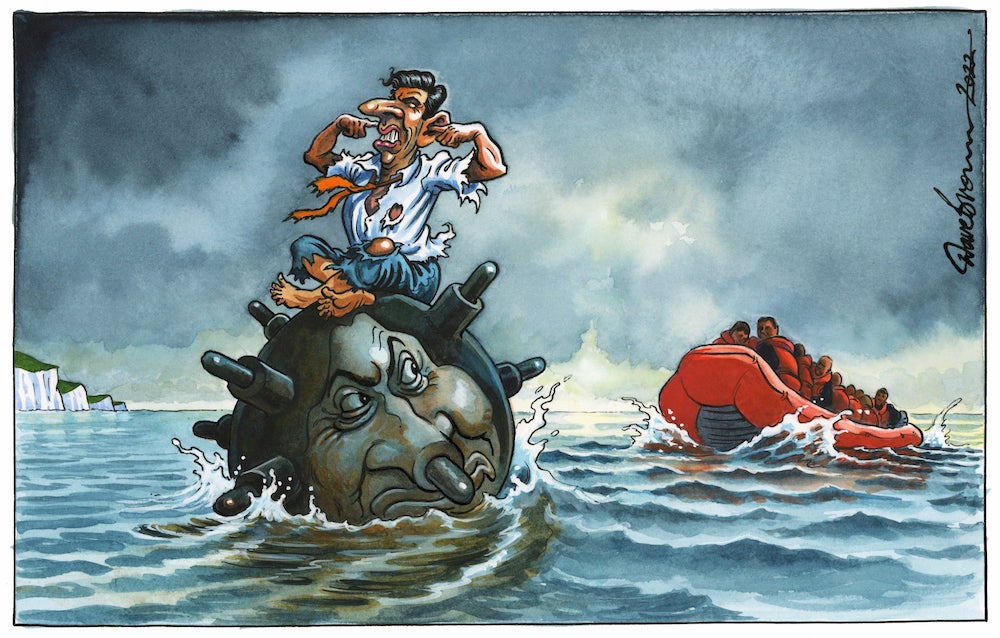To listen to Suella Braverman, for the moment still home secretary, anyone would think that the south coast of Britain was being assaulted by Russian commandos or nefarious agents of Kim Jong-un in some latter day version of Operation Sealion.
Deploying the shocking ideas and repulsive imagery that has become her political leitmotif, Ms Braverman calls the arrival of unarmed, pitiful, bedraggled refugees on Border Force and RNLI boats an “invasion”. Ms Braverman was especially foolish to speak of invasion after a petrol bombed had attacked an asylum centre in Dover.
No doubt there are some potentially risky elements on board, given the apparent involvement of some Albanian crime gangs, but the descriptions of these people in certain sections of the media as “foot soldiers” being sent to meet their “generals” are as absurd as they are unhelpful.
The images of women and young children in the squalid Manston detention centre in Kent, for example, demonstrate that this is no organised paramilitary exercise, but simply the latest iteration in an ancient story of persecuted people in search of a better life. They’ve no wish to occupy Britain like Napoleon or Hitler. On the contrary, they wish to make a life here and contribute, just as generations of migrants have before them – and help build a better Britain.
The demonisation of migrants is hardly new – the Irish, the Jews, the Windrush generation, the East African Asians, the Eastern Europeans and many others have suffered the same type of “othering”; robbing them of their humanity – and human rights – by labelling them “illegals” (and destitute, diseased and malevolent with it).
People with a Muslim background have been especially brutally treated and misunderstood. They and their descendants have done what they were always going to do, and make Britain a stronger country. There isn’t anything necessarily or intrinsically to be frightened of if someone comes to the UK seeking safety. It has been going on for centuries.
Indeed, the increasing routine dismissal of refugees as “illegals” by MPs who should know better is an especially corrosive trend. There is no such thing as an “illegal migrant” if they are seeking asylum. Anyone, under the international conventions, can make a claim, no matter whence they came or how they undertook their journey. The fact that France is a free country is not relevant. If they make a claim, which they invariably do – and it fails and they refuse to leave the UK – then their continued presence would indeed be unlawful and they may be removed. But even then, they are still people – and they have inalienable human rights. Human rights are universal.
There is a rising proportion of Albanians among the refugees and there have been allegations that criminal gangs are involved in the trafficking. Yet research by The Independent has revealed that the majority of Albanian asylum seekers granted leave to remain in the UK in the past year were trafficked women.
Even so, any gangs that are found to exist should be broken up by police action and by giving the National Crime Agency the resources it needs. If people really are abusing modern slavery laws, then they can be tightened up. Much more useful would be an emergency effort to clear the backlog of claims which has given rise to the overcrowding at Manston, the excessive use of hotel accommodation and the fact that migrants can wait years rather than weeks or months for a claim to be determined – a significant attraction for unscrupulous smugglers.
But there is a damaging illusion that the language of “invasion” and “Albanian crime rings” engenders, which is that the actual number of genuine asylum seekers is relatively small. It is a comforting and politically convenient fantasy that has been fostered, sometimes cynically, for many decades.
Such are the dislocations caused by war and climate change across the Middle East, Northern Africa and Eastern Europe that the number of genuine refugees wishing to come to the UK is simply rather higher than they have been in the past, including legal flows of people.
To keep up to speed with all the latest opinions and comment sign up to our free weekly Voices Dispatches newsletter by clicking here
No one, for example, can pretend that Syria under Isis was a safe and secure place, and the rubble of towns and cities prove the destruction of civilised life. Hence the 1 million refugees taken in by Germany a few years ago.
That is the real challenge to Britain, making the most of the inevitability of mass population movements in times of war and crisis, and using the people who seek to contribute to the country to mutual advantage.
After all, the UK is suffering a severe labour shortage. Perhaps some of those in the dinghies have the skills needed, and some could help build the housing that is in such demand.
Rather than being billeted in hotels and banned from paid employment, it would be better if they could be allowed to work in hotels desperate for staff. The great majority of the “invaders” are friendly and useful people. They’re being treated grotesquely.







Join our commenting forum
Join thought-provoking conversations, follow other Independent readers and see their replies
Comments